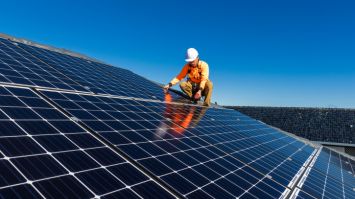First Fully Solar-Powered Airport: Cochin International Airport (CIAL), located in Kerala, India, is the world’s first fully solar-powered airport. It holds the distinction of being the first airport in the world to run entirely on solar energy, without depending on conventional power sources.
When Did It Become Fully Solar-Powered?
The airport became completely solar-powered on 18 August 2015. A massive solar power plant of 12 megawatts (MWp) was installed, featuring 46,150 solar panels spread across 45 acres of land near the airport’s cargo complex.

How Does the Solar System Work?
The solar panels generate enough electricity to meet the airport’s total power requirements. The system produces more energy than the airport consumes and sends the excess power back to the state electricity grid, making it absolutely power-neutral.
Recognition and Awards
Cochin International Airport received the United Nations “Champion of the Earth” Award in 2018. This global honour was given for its pioneering effort in using renewable energy and setting a sustainable model for airports around the world.
Environmental Impact
The airport’s solar initiative helps reduce around 300,000 tonnes of carbon dioxide emissions over 25 years. It plays a vital role in promoting clean energy and reducing dependence on fossil fuels in India’s aviation sector.
Why Cochin Airport Is a Global Model?
CIAL’s success has inspired many other airports across the world to shift to solar energy. It proves that large infrastructures like airports can operate sustainably while cutting costs and protecting the environment.

Interesting Facts About Solar Power
1. The Sun Can Power the Whole Earth
The sunlight that reaches Earth in just one hour can meet the world’s energy needs for an entire year. This shows how powerful and abundant solar energy truly is.
2. Solar Energy Is the Fastest-Growing Renewable Source
Solar power is now the fastest-growing renewable energy in the world. Many countries are switching to solar plants and rooftop panels to reduce carbon emissions.
3. Solar Panels Work Even on Cloudy Days
Solar panels do not need direct sunlight all the time. They can still generate electricity from diffused light on cloudy or rainy days, making them reliable in many climates.
4. Solar Power Reduces Electricity Bills
By installing solar panels, homes and businesses can cut down on electricity costs. Many countries also offer tax benefits and incentives to promote solar energy use.
5. Solar Energy Helps Fight Climate Change
Solar power is clean and renewable, meaning it does not release harmful greenhouse gases. It plays a key role in reducing global warming and protecting the environment.
Read more: Which Is the World’s First Cashless Country?
Comments
All Comments (0)
Join the conversation